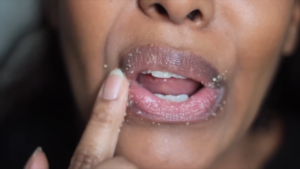Maintaining pink and healthy lips naturally involves adopting simple yet effective practices that promote hydration, protection, and overall lip care. Hydration is key, so ensure you drink plenty of water throughout the day to keep your lips moisturized from within. Exfoliate your lips gently using a homemade sugar scrub or a soft toothbrush to remove dead skin cells regularly. Protect your lips from harsh weather conditions by applying a lip balm with SPF before heading outdoors. Avoid licking your lips excessively as this can cause dryness. Incorporate natural remedies like coconut oil or honey for added nourishment. These tips will help you achieve and maintain soft, pink lips naturally.
Importance of Hydration for Lip Health
Our lips are often overlooked when it comes to skincare, but staying hydrated is crucial for their health and appearance. Unlike most of our skin, lips lack the sebaceous glands that produce natural oils. This makes them more susceptible to dryness, chapping, and cracking. Proper hydration ensures your lips retain moisture, keeping them plump, supple, and healthy. When dehydrated, lips become dry, flaky, and prone to painful cracks. Drinking plenty of water throughout the day is the foundation of good lip health. Additionally, incorporating hydrating fruits and vegetables into your diet can further contribute to keeping your lips moisturized from the inside out. Remember, healthy lips not only feel better, but they also enhance your overall smile and appearance.
Exfoliation Techniques for Soft Lips
Just like the rest of your skin, lips benefit from regular exfoliation. This process removes dead skin cells, revealing smoother, softer lips underneath. However, the delicate nature of lips requires a gentle touch. Avoid harsh scrubs or abrasive ingredients. Instead, create a DIY lip scrub by mixing brown sugar with honey or olive oil. Gently massage the scrub onto your lips in circular motions, focusing on areas that feel rough. Rinse thoroughly with lukewarm water and follow up with a hydrating lip balm to lock in moisture. Alternatively, use a soft washcloth dampened with warm water to gently buff away dead skin. Exfoliation should be done once or twice a week to maintain healthy, smooth lips.
Choosing the Right Lip Balm: Ingredients to Look For
Lip balms are your best defense against dry, chapped lips. However, with so many options available, choosing the right one can be overwhelming. Look for lip balms formulated with natural and hydrating ingredients. Key ingredients to prioritize include shea butter, cocoa butter, beeswax, and petroleum jelly. These ingredients lock in moisture and create a protective barrier against environmental elements. Avoid lip balms with harsh chemicals, fragrances, or alcohol, as they can irritate and dry out your lips. Opt for lip balms with SPF protection, especially during sunny days, to shield your lips from harmful UV rays that can contribute to dryness and premature aging.
Protecting Lips from Sun Damage with SPF
Sun protection isn’t just for your face; your lips need it too! The delicate skin on your lips is susceptible to sunburn, just like any other part of your body. Sun damage can lead to dryness, chapping, and even wrinkles on your lips. Make using a lip balm with SPF a daily habit, even on cloudy days. Choose a lip balm with an SPF of 30 or higher for broad-spectrum protection against UVA and UVB rays. Reapply your lip balm with SPF throughout the day, especially after eating, drinking, or swimming. By incorporating sun protection into your lip care routine, you can prevent damage and keep your lips healthy, smooth, and protected.
Avoiding Harmful Habits: Why You Shouldn’t Lick Your Lips
Licking your lips might seem like a quick fix for dryness, but it can actually do more harm than good. Saliva evaporates quickly, leaving your lips feeling drier and more parched than before. The enzymes in saliva can also irritate the delicate lip skin, leading to inflammation and chapping. If you find yourself licking your lips habitually, try carrying a lip balm with you and applying it whenever your lips feel dry. Address the underlying cause of dryness by staying hydrated and using a humidifier at night. Breaking the habit of licking your lips will not only prevent irritation but also keep them healthier and more comfortable.
Natural Remedies for Dry and Chapped Lips
Dry and chapped lips can be a nuisance, but there are several natural remedies you can use to soothe and heal them. Honey is a natural humectant, meaning it attracts and retains moisture. Apply a thin layer of honey to your lips and leave it on for 15 minutes before rinsing. Coconut oil is another effective remedy with anti-inflammatory and moisturizing properties. You can apply pure coconut oil directly to your lips or create a DIY lip balm by mixing it with beeswax and shea butter. Aloe vera gel has calming and healing properties that can help soothe irritation and promote healing in chapped lips. Apply a thin layer of aloe vera gel to your lips and leave it on overnight for best results. Remember, consistency is key! Regularly applying these natural remedies will help restore your lips to their healthy and supple state.
Dietary Tips for Healthy Lips
Just like the rest of your body, your lips benefit from a healthy diet. Eating a balanced diet rich in vitamins and essential nutrients can contribute to healthy lips. Ensure you’re getting enough vitamin A, which plays a crucial role in skin health and keeps your lips moist. Include fruits and vegetables rich in vitamin A like carrots, sweet potatoes, cantaloupe, and spinach in your diet. B vitamins are also essential for healthy lips. Include whole grains, legumes, and nuts in your meals to ensure you’re getting enough B vitamins. Don’t forget to stay hydrated! Drinking plenty of water throughout the day is vital for overall health and helps keep your lips plump and moisturized. By incorporating these dietary tips into your routine, you can nourish your lips from the inside out and promote their health and appearance.
Daily Lip Care Routine: Morning and Night
Developing a simple daily lip care routine can make a significant difference in the health and appearance of your lips. In the morning, gently exfoliate your lips to remove dead skin cells. You can use a soft washcloth dampened with warm water or a DIY lip scrub made with brown sugar and honey. Follow up with a hydrating lip balm with SPF to protect your lips from the sun’s harmful rays. Before bed, apply a thicker layer of a more nourishing lip balm or petroleum jelly. This will help lock in moisture while you sleep and allow your lips to repair and heal overnight. Repeating this routine morning and night will keep your lips soft, smooth, and healthy.
Lifestyle Changes for Better Lip Health
Making lifestyle changes can significantly improve your lip health and keep them looking and feeling great. Start by incorporating a balanced diet rich in vitamins and minerals essential for skin health, like vitamin E and omega-3 fatty acids found in nuts, seeds, and fish. Avoid smoking and limit your alcohol intake, as these habits can contribute to dryness and discoloration of the lips. Protect your lips from harsh weather conditions by using a scarf or lip balm with SPF. Additionally, practice good oral hygiene and avoid biting or licking your lips, as this can lead to irritation and chapping. Regularly moisturize your lips with hydrating lip balms to maintain softness and prevent dehydration.
Understanding Common Lip Problems and Solutions
Understanding common lip problems is crucial for effective management and maintaining lip health. Chapped lips, often caused by dehydration or weather conditions, can be alleviated by regular hydration and using moisturizing lip balms. Cold sores, caused by the herpes simplex virus, can be managed with antiviral medications and avoiding triggers like stress and sun exposure. Lip discoloration, such as darkening or uneven pigmentation, may result from smoking, excessive sun exposure, or certain medications, and can be addressed with SPF lip balms and avoiding tobacco. Lastly, allergic reactions to lip products can be prevented by patch testing and opting for hypoallergenic options. Understanding these issues helps in choosing the right solutions for healthier lips.








